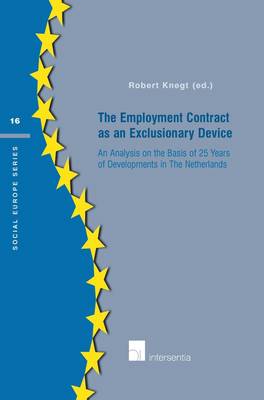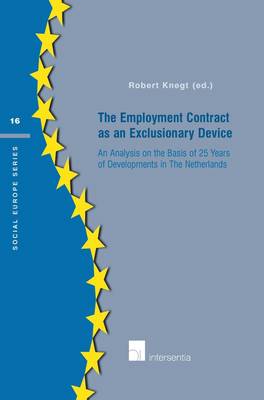
- Retrait gratuit dans votre magasin Club
- 7.000.000 titres dans notre catalogue
- Payer en toute sécurité
- Toujours un magasin près de chez vous
- Retrait gratuit dans votre magasin Club
- 7.000.0000 titres dans notre catalogue
- Payer en toute sécurité
- Toujours un magasin près de chez vous
The Employment Contract as an Exclusionary Device
An Analysis on the Basis of 25 Years of Developments in the Netherlands Volume 16
Robert KnegtDescription
The employment contract has, in a relatively short time, developed into the atom of the normative structuralization of labour relations. Its basic form may be simple, directed at restricting the scope of respective commitments to the exchange of labour for money. But the employment contract has meanwhile been developing into a junction of ever more complicated normative arrangements, thereby absorbing all kinds of matter that were initially left out of its scope. It has become a 'heavy' legal form, in particular because welfare states have used the employment contract as a point of application for socio-economic policies.
Is the employment contract being overloaded? Are there significant changes in what matter is being excluded from, and what is being included in the employment relation?
In this book the employment contract is analysed from the perspective of inclusion and exclusion (as to its form, its content, and the working persons to be covered). The first part of the book contains an introduction to this perspective, to the history of the labour contract, and to developments in labour law in The Netherlands. In part two, the perspective is applied to four fields of regulation that are linked to the employment contract (regarding sickness, care, training and pensions), on the basis of an analysis of developments in the Netherlands during the last 25 years. The book contrasts them with developments in other European countries and relates them to international law. In the final part of the book the authors try to determine to what extent the employment contract is (still) an adequate device for regulating labour relations.
To those interested in recent developments in labour law, and the often contested regulation of its adjoining fields, the book offers a careful analysis of developments in The Netherlands. Its application of a perspective of exclusion and inclusion makes, however, the thrust of the book much wider.
About this book:
'[...] an important and valuable sourcebook...'
Beata Nacsa in the European Journal of Social Security 2008 (409).
Spécifications
Parties prenantes
- Auteur(s) :
- Editeur:
Contenu
- Nombre de pages :
- 222
- Langue:
- Anglais
- Collection :
- Tome:
- n° 16
Caractéristiques
- EAN:
- 9789050958059
- Date de parution :
- 05-05-08
- Format:
- Livre broché
- Format numérique:
- Trade paperback (VS)
- Dimensions :
- 160 mm x 240 mm
- Poids :
- 385 g

Les avis
Nous publions uniquement les avis qui respectent les conditions requises. Consultez nos conditions pour les avis.






